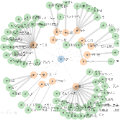With the recent surge in social applications relying on knowledge graphs, the need for techniques to ensure fairness in KG based methods is becoming increasingly evident. Previous works have demonstrated that KGs are prone to various social biases, and have proposed multiple methods for debiasing them. However, in such studies, the focus has been on debiasing techniques, while the relations to be debiased are specified manually by the user. As manual specification is itself susceptible to human cognitive bias, there is a need for a system capable of quantifying and exposing biases, that can support more informed decisions on what to debias. To address this gap in the literature, we describe a framework for identifying biases present in knowledge graph embeddings, based on numerical bias metrics. We illustrate the framework with three different bias measures on the task of profession prediction, and it can be flexibly extended to further bias definitions and applications. The relations flagged as biased can then be handed to decision makers for judgement upon subsequent debiasing.
翻译:随着最近依靠知识图表的社会应用的激增,确保以KG为基础的方法的公平性的技术需要越来越明显。以前的工作表明,KGs容易受到各种社会偏见的影响,并提出了贬低这些偏见的多种方法。然而,在这类研究中,重点一直放在贬低偏见的技术上,而拟贬低偏见的关系则由用户手工指定。由于人工规格本身容易受到人类认知偏见的影响,因此需要有一个能够量化和揭露偏见的系统,这种系统可以支持对如何贬低偏见作出更知情的决定。为了弥补文献中的这一差距,我们描述了一个框架,用以根据数值偏差指标确定知识图嵌入中的偏见。我们用三种不同的偏差计量标准来说明该框架,可以灵活地扩展到进一步的偏差定义和应用。随后,被标为偏差的关系可以交给决策者,以便对其随后的贬低偏见作出判断。



